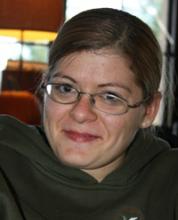By Kelly Dougherty
Former Sergeant, Army National Guard
Executive Director of Iraq Veterans Against the War
On Nov. 26, Sammantha Owen-Ewing, one of IVAW’s newest members, the wife of my friend Scott, and a former Army medic like me, committed suicide in her Rhode Island home. Sammantha was only 20 years old, and in that short time had been an Army medic training to become a nurse while stationed at Walter Reed, then became a patient herself in Walter Reed’s mental health ward. In June, she married Scott Ewing, also an IVAW member, and was discharged from the Army. Despite an uphill battle to receive care from the VA, things seemed to be looking up; she was getting settled into life in Rhode Island, planned to continue her medical career, and was becoming active in Iraq Veterans Against the War. Although most of us were never fortunate enough to know Sammantha, she was one of us and we mourn her passing.
Sammantha Owen-Ewing
It is impossible to sum up the life of a person, their personality and how much they meant to the people who loved them, in a few short lines. In her obituary, Sammantha was described as “sweet, thoughtful, and loving. She brought joy to the lives of those around her.” I’m sorry I will never meet Sammantha and my deepest condolences go out to her family. I know that many IVAW members have suffered through depression, PTSD, and other forms of internal anguish, and many of us still deal with these things on a daily basis.
IVAW has set up a memorial fund on behalf of Sammantha Owen-Ewing to help her family offset her funeral costs. We will be accepting donations through the end of December, if you’d like to make a donation, go to www.ivaw.org/memorialfund.
Suicide is a very real threat, especially for veterans. A recent CBS news investigation found that in 2005, veterans were twice as likely to commit suicide as non-vets, with 120 veteran suicides each week. Those of us who are between the ages of 20-24 have the highest rate of suicides, between two and four times higher than our civilian peers. For many veterans, the fighting doesn’t end once we return from a war zone or get discharged from the military.

